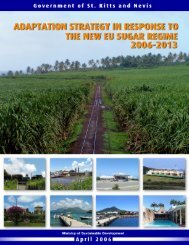Jobs
Jobs - G20 Civil
Jobs - G20 Civil
- No tags were found...
Create successful ePaper yourself
Turn your PDF publications into a flip-book with our unique Google optimized e-Paper software.
<strong>Jobs</strong> and social cohesion 137<br />
The exclusionary nature of networks is highlighted<br />
by the experience of migrants moving<br />
from rural areas to cities. Migrants often choose<br />
destinations where they have connections. But<br />
if they do not, they can be uprooted from family<br />
and community ties that provide economic<br />
and social support, including access to jobs.<br />
They may also lack the information needed to<br />
integrate into their new destinations. Migrants<br />
moving across borders or regions, internally displaced<br />
persons or refugees fleeing from conflict<br />
or returning after a peace agreement, and soldiers<br />
demobilized after conflict may be particularly<br />
vulnerable to exclusion from job opportunities.<br />
This is a concern in conflict situations as<br />
well as in contexts of structural transformation,<br />
when massive numbers of people move from<br />
rural to urban areas. 45 Networks also do not<br />
reach many among the self-employed, especially<br />
home-based workers who work in isolation and<br />
domestic workers who lack opportunities to interact<br />
with others.<br />
<strong>Jobs</strong> influence aspirations and<br />
expectations<br />
The various ways in which jobs are distributed<br />
can affect expectations and aspirations and influence<br />
whether people believe that they have a<br />
stake in society. The jobs that other people have<br />
can contribute to an individual’s values, attitudes,<br />
and behaviors. Children’s goals for the future<br />
may be influenced by whether their parents<br />
have jobs or not, as well as by the types of jobs<br />
their parents have. Frustration and even social<br />
unrest may develop when education and effort<br />
are not rewarded or when people perceive the<br />
distribution of jobs to be unfair.<br />
The Arab Spring was as much or more<br />
about political voice as it was about jobs. Yet<br />
widespread disappointment, especially among<br />
youth, about the lack of job opportunities and<br />
frustration with the allocation of jobs based on<br />
connections rather than merit echoed across<br />
countries. A young person in Egypt commented,<br />
“To work in a big company, you’ve got to have<br />
wasta [connections; literally, a middleman]. Regardless<br />
of your qualifications, you must search<br />
for someone to secure the job for you. In some<br />
cases, you have to pay money.” 46 Social assessments<br />
in the Republic of Yemen documented<br />
frustration with the allocation of jobs based on<br />
tribal, family background, or party affiliation.<br />
Respondents at a focus group explained that,<br />
“to get jobs, one needs someone to speak for<br />
him, particularly from Sana’a.” Young people reported<br />
that inheriting a civil service post from<br />
one’s father was not viewed as wrong under the<br />
country’s civil service rules. 47<br />
<strong>Jobs</strong> that are allocated based on connections<br />
and other circumstances beyond the control<br />
of an individual can influence whether people<br />
view society as fair. Recent work on the measurement<br />
of inequality of opportunities examines<br />
the extent to which access to basic services<br />
that are essential for human development, such<br />
as education, health, nutrition, and sanitation,<br />
is based on circumstances of birth or arises because<br />
of inequality within society (box 4.7). 48<br />
Application of this approach to access to jobs<br />
considers the extent to which opportunities are<br />
related to circumstances at birth, including gender,<br />
ethnicity, and parental educational attainment<br />
and political affiliation, or to attributes,<br />
including educational attainment and age. 49 Results<br />
from 29 countries in Europe and Central<br />
Asia indicate that inequality across groups based<br />
on circumstances and attributes varies between<br />
3 and 20 percent. The share of inequality attributable<br />
to circumstances is substantial in most<br />
cases, contributing to more than half of the<br />
overall inequality (figure 4.5).<br />
Circumstances at birth contribute the most<br />
to inequality in Azerbaijan, followed by Uzbekistan,<br />
Georgia, Turkey and Albania. In these<br />
countries, such factors contribute the most to<br />
inequality in access to jobs. Education plays an<br />
outsized role in inequality in some countries—<br />
Armenia stands out in particular, along with Albania,<br />
Bulgaria, and Romania.<br />
Similar analysis for 18 countries in Latin<br />
America using the 1990 Latinobarómetro survey<br />
confirms these findings. On the whole, the<br />
education of the worker and the circumstances<br />
he or she was born into play important roles<br />
in explaining inequalities in access to jobs, and<br />
the role of education is especially important for<br />
regular employment in the formal sector. 50<br />
* * *<br />
The interaction of jobs and social cohesion is not<br />
linear or simple to disentangle. This is an emerging<br />
area for further research across disciplines.<br />
The effect of jobs on trust and civic engagement<br />
at the individual level suggests that exchanges
















